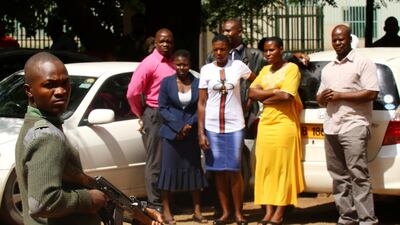Zimbabwe's public workers have rejected a second offer to raise their salaries and demanded to be paid in dollars, the day after a rights group said 12 people have died in ongoing anti-government protests.
At least 78 people have been treated for gunshot wounds and 242 others received medical treatment after being assaulted, tortured or bitten by dogs that were set on them, the Zimbabwe Human Rights NGO Forum said on Friday.
The same day hundreds of Zimbabweans were detained on public order charges, as the United Nations urged an end to a security crackdown and an internet blackout.
Thousands of Zimbabweans have taken to the streets over the past week, barricading roads and torching some government property after the Zimbabwe Congress of Trade Unions called for a strike to protest the state’s doubling of fuel prices.
Security forces have responded to the demonstrations with live ammunition, rubber bullets and tear gas while the government twice shut down the internet to stem the flow of information.
The Forum said it has recorded 466 “arbitrary arrests and detentions” and is still compiling a list of people displaced by the violence.
_______________
Read more:
As it fights corruption and bureaucracy, Zimbabwe looks to UAE investors
Mass protests in Zimbabwe after fuel prices more than doubled
_______________
Zimbabweans, who have seen their purchasing power eroded by soaring inflation despite adopting the dollar in 2009, say President Emmerson Mnangagwa has not delivered on pre-election pledges to kick-start growth after the exit of Robert Mugabe.
Mr Mnangagwa has promised a clean break from the 37-year era of Mugabe, who was forced out in a de facto coup in November 2017 but the economy is afflicted by a severe shortage of dollars which has led to shortages of fuel and medicines.
The government has offered to pay 305,000 civil servants, including the security forces, $300 million for the period between April and December, a monthly average rise of $109 each.
But workers rejected this latest offer, the second in two weeks at a meeting on Friday, Thomas Muzondo, deputy chairman of the Apex Council, a grouping of all civil service unions, said, adding that a third round of talks was scheduled for next week.
"We insisted on US dollar salaries but the government totally rejected this, saying they do not manufacture dollars. We are now consulting our membership but we told the government that their offer is nowhere near our expectations," he said.
Civil servants, who gave Mr Mnangagwa's government a 14-day notice to strike on January 8, want to be paid in dollars or have the monthly salary of the lowest paid worker increased from $414 to $1,700, Mr Muzondo said.
Supplies of dollars have dried up and Zimbabweans have seen their deposits in the electronic banking system losing value, raising fears that the southern African nation might be heading for its second financial collapse in a decade.

